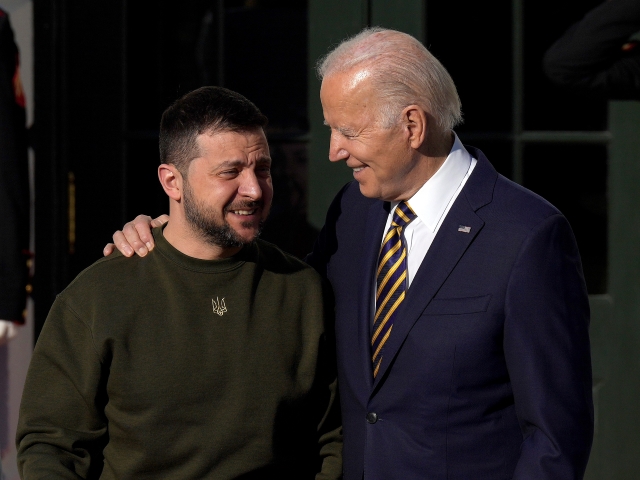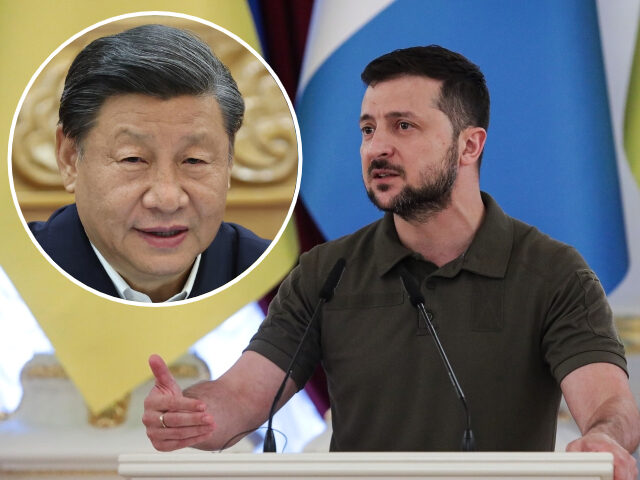China’s Foreign Ministry and state media portrayed dictator Xi Jinping’s phone call with Ukrainian President Volodymyr Zelensky on Wednesday as a sweeping diplomatic triumph, with Zelensky practically begging Beijing to take a leading role in negotiations to end the Russian invasion.
Chinese Foreign Ministry spokeswoman Mao Ning said on Thursday that Xi offered reassurances that China still values its “strategic partnership” with Ukraine, a top trading partner and client of China’s Belt and Road Initiative (BRI), even though China’s close friends in Moscow are attempting to erase Ukraine from the map.
Xi still refuses to condemn the Russian invasion, but according to Mao, he gave Zelensky a long-winded rundown of the complicated bureaucratic mechanisms China would construct to facilitate peace negotiations:
President Xi pointed out that the Ukraine crisis is evolving in complex ways with major impacts on the international landscape. On the Ukraine crisis, China always stands on the side of peace. Its core stance is to facilitate talks for peace. President Xi noted his proposals of four points about what must be done, four things the international community must do together and three observations. On this basis, China released its Position on the Political Settlement of the Ukraine Crisis. China did not create the Ukraine crisis, nor is it a party to the crisis. As a permanent member of the UN Security Council and a responsible major country, China would not sit idly by, nor would it add oil to the fire, still less exploit the situation for self gains. Everything China does is aboveboard. Dialogue and negotiation are the only viable way forward. There is no winner in nuclear wars. On the nuclear issue, all relevant parties must stay calm and exercise restraint, truly act in the interests of their own future and that of humanity, and jointly manage the crisis. With rational thinking and voices now on the rise, it is important to seize the opportunity and build up favorable conditions for the political settlement of the crisis. It is hoped that all parties would seriously reflect on the Ukraine crisis and jointly explore ways to bring lasting peace and security to Europe through dialogue. China will continue to facilitate talks for peace and make its efforts for early ceasefire and restoration of peace. China will send the Special Representative of the Chinese Government on Eurasian Affairs to Ukraine and other countries to have in-depth communication with all parties on the political settlement of the Ukraine crisis. China has sent multiple batches of humanitarian assistance to Ukraine and will keep providing help to the best of its ability.
Presented in a single paragraph, as the Chinese Foreign Ministry did in its published transcript of Mao’s remarks because there is no better way to illustrate the cosmic gulf between China’s endless rhetoric about peace-loving responsible nations and its absolute lack of concrete action against its murderous partners in Moscow. The regime in Beijing loves to talk for hours about how it should never be held accountable for anything it does or fails to do.
Amusingly, Mao’s summary of Zelensky’s side of the telephone conversation was contained in two brief sentences – and it was entirely about Zelensky praising the Chinese dictator for winning his phony “election” to another term of absolute power:
President Zelensky congratulated President Xi on his re-election and commended China for its remarkable achievements. He expressed confidence that under the leadership of President Xi, China will successfully address various challenges and continue to move forward.
Mao offhandedly confirmed Ukrainian media reports that China is sending a “special envoy” to Ukraine, led by China’s former ambassador to Russia, Li Hu. A reporter observed that Li’s resume could “bring into question whether he represents a neutral party to the discussions,” a criticism Mao refused to address.
China’s state-run Global Times ignored ignored Russia’s actual response to the Xi-Zelensky call – the Russian Foreign Ministry derided Zelensky as a puppet of warmongering Western interests and talking to him was a waste of Xi’s time – to claim that Xi’s offer of leadership in resolving the crisis was “sincerely welcomed by both Kiev and Moscow, despite some voices from the West, especially the U.S., that have tried to distort China’s mediation efforts.”
The Global Times sneered that Ukraine knows China is its only hope for peace, as American influence wanes under President Joe Biden:
Chinese analysts said the call readout shows that Ukraine holds a different attitude toward China’s mediation efforts compared to the US. On March 21, White House National Security Council spokesperson John Kirby told reporters that the US does not see China as capable of being an impartial mediator between Russia and Ukraine.
Experts said this shows that the US has failed to provide hope of a peaceful solution for the relevant parties, including Ukraine, Russia and other European countries, and this is why even Kiev, who received weapons from the US and NATO, is now seeking dialogue and the possibility of political settlement from China.
Another “Chinese expert” said that France and Germany have acknowledged China’s “fair and objective” position along with Russia and Ukraine, so Washington is the only real obstacle to a ceasefire brokered by Beijing.
The Global Times pointed to the rapprochement between Saudi Arabia and Iran as evidence that China is now the world’s leading peacemaker, complaining that it would be “too early to set high expectations” for a similar triumph in Ukraine because “Kiev has been deeply affected by Washington.”
The Global Times concluded:
Now that Ukraine shows a similar attitude to China’s mediation with other relevant parties on the continent of Europe, like the EU and France, who really want the conflict to be stopped, Kiev has perhaps started to realize that U.S. and NATO military support cannot effectively protect Ukraine or stop the bloodshed, but will only prolong the conflict.
A Global Times editorial on Thursday offered a crude cartoon of Uncle Sam throwing gasoline on the “Ukraine Crisis” fire while a Chinese firefighter tied to extinguish the blaze, but the editorial was mostly about mumbling excuses for China standing by while its Russian “unlimited partner” commits endless war crimes. This passive acquiescence to a brutal war of conquest was hilariously portrayed as “Eastern wisdom.”
“It should be noted that since the outbreak of the Russia-Ukraine conflict, the U.S. and Western public opinion has thrown a lot of mud on China, even creating rumors in an attempt to drag China down,” the editors huffed, adding:
But a clean hand wants no washing. As time goes by, those accusations are self-defeating, and the image of China as a peaceful builder is becoming clearer and clearer. Both Russia and Ukraine can see this, so can other countries and the international community. Justice will prevail.
The Global Times took a stab at suggesting even the Biden administration is beginning to recognize Xi’s leadership because the White House praised the Xi-Zelensky call as a “good thing.”

U.S. President Joe Biden, right, and Chinese President Xi Jinping shake hands before a meeting on the sidelines of the G20 summit meeting, Monday, Nov. 14, 2022, in Bali, Indonesia (AP Photo/Alex Brandon).

U.S. President Joe Biden (R) welcomes President of Ukraine Volodymyr Zelensky to the White House on December 21, 2022, in Washington, DC. (Photo by Drew Angerer/Getty Images).
The actual quote from White House national security spokesman John Kirby on Wednesday was more than two words long and a lot less enthusiastic than the Global Times wanted its readers to believe.
“We welcome the news that there was a phone call between President Xi and President Zelensky. We think that’s a good thing. Now, whether that’s going to lead to some sort of meaningful peace movement or plan or proposal, I just don’t think we know that right now,” Kirby said.
Kirby went on to essentially reject the vague “peace plan” from Beijing, which Chinese officials and state media constantly trumpet as a historic achievement in diplomacy because peace can only be negotiated “when President Zelensky is ready for it” and “where he can do it from a position of strength.” The Chinese plan does not call for Russia to withdraw any of its forces from Ukraine or return any of the territory it has seized.
Canada’s Globe and Mail on Thursday was among the observers who thought Xi’s phone call was actually quite menacing toward Zelensky – a gangsterish ultimatum that offered the Ukrainian leader a choice between meeting all of China’s political and economic demands or watching in despair as China begins actively supporting the Russian war effort:
In finally accepting Mr. Zelensky’s months-old invitation to talk – while Mr. Xi has been in regular contact with Russian President Vladimir Putin, he hadn’t spoken to Mr. Zelensky since before the start of the invasion in February, 2022 – the Chinese President also did so at a moment that could work in Moscow’s favour.
Ukrainian troops are in the final stages of preparations for a counteroffensive they hope will lead to the liberation of parts of southern and eastern Ukraine that are currently under Russian occupation. Now that counteroffensive will look, to some, like an aggressive move, as though Ukraine rebuffed a chance to talk peace and instead chose to continue the war.
That’s nonsense, of course. Ukrainian officials rightly point out that Russia can end the war at any moment simply by withdrawing its troops and ending its missile attacks on Ukrainian cities. But there are large parts of the globe, notably in the BRICS alliance countries – Brazil, Russia, India, China and South Africa – where Moscow’s narrative holds sway.
The Globe and Mail thought Xi included a small jab at Russian President Vladimir Putin by calling Zelensky on April 26, which happens to be the anniversary of the 1986 nuclear disaster in Chernobyl.
“By choosing the Chernobyl anniversary to finally speak with Mr. Zelensky, Mr. Xi was further clarifying his own red line in the war. China stands with Russia – but with an unambiguous caveat: no use of nuclear weapons,” the Globe and Mail proposed.
RELATED: Zelensky Releases Movie Trailer-Style Video Marking One-Year Anniversary of War in Ukraine
Video Source: Volodymyr Zelensky via Storyful
COMMENTS
Please let us know if you're having issues with commenting.